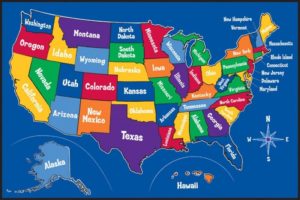
Which State’s Adjusters License Should I Get?
Share
When it comes to starting a career in claims adjusting, there are many questions you’ll have to ask yourself:
- What type of claims do I want to handle?
- Should I work for an independent firm, a third-party administrator or an insurance carrier?
- Do I want to work in an office or out in the field?
- Is this coffee that I’m drinking right now strong enough to get me through all of these decisions…? Okay… maybe not this last one.
While these questions and more swim around in your head, there’s one question you’ll need to answer before you spend too much brain power on the others:
In which state should I get my license?
In most cases, the answer is: “the license for the state in which you live…UNLESS you live in a state that doesn’t require a license. Sixteen (16) states do not require that adjusters be licensed. They are:
- Colorado
- District of Columbia
- Illinois
- Iowa
- Kansas
- Maryland
- Missouri
- Nebraska
- New Jersey
- North Dakota
- Ohio
- Pennsylvania
- South Dakota
- Tennessee
- Virginia
- Wisconsin
If you do not live in any of the above states, the first license you need will be the one from the state you live in.
Every state has its own unique laws regarding the licensing of insurance claims adjusters. You may hear buzz about which state is “best” for an adjuster’s license…; but the bottom line is pretty simple.
Let’s assume that you live in Alabama, and you want to secure an adjuster license in Texas. Well, you are certainly welcome to try, but Texas won’t approve your application. because Alabama has its own licensing requirement for adjusters. Texas will require that you get your Alabama resident license first. THEN, and only then, you can apply for a Texas non-resident license, and you won’t have to take the Texas Adjuster Licensing Exam or complete an Adjuster Pre-licensing course. The bottom line for Texas and all other states that require adjuster licensure is:
If you live in a state that requires that adjusters be duly licensed, you will need to get licensed in YOUR HOME STATE before worrying about licensure in any other state.
Now, in the alternative, if you do live in one of the 16 states that does not require licensure of insurance claims adjusters, you have a couple options.
Sure, you might be able to adjust claims in that state and a few others without getting a license, but what if you have an opportunity to adjust claims in states that DO require the license? Does this mean you’ll need to take exams for every one of those states? Thankfully, the answer is “NO”!
 Thanks to what is called a “Designated Home State” License (also referred to as a “DHS” License), you can qualify for and maintain an adjuster’s license in a state other than your home state. This state will “stand in” as your home state for “reciprocity” purposes. (We will get more into reciprocity in our next blog post). Only two (2) states issue these DHS licenses, Florida and Texas. Our previous two posts outlined the process for obtaining a license in those states.
Thanks to what is called a “Designated Home State” License (also referred to as a “DHS” License), you can qualify for and maintain an adjuster’s license in a state other than your home state. This state will “stand in” as your home state for “reciprocity” purposes. (We will get more into reciprocity in our next blog post). Only two (2) states issue these DHS licenses, Florida and Texas. Our previous two posts outlined the process for obtaining a license in those states.
Assume that you live in Illinois, a state that does not require license of its adjusters, and you want to be able to handle catastrophe claims, especially in states that are constantly ravaged by hurricanes. Most of the states that are subject to these perils DO require that their adjusters be licensed.
So, in this case, you could easily take an approved online Florida or Texas adjuster licensing course from the comfort of your home in Illinois, waive the state’s adjuster’s exam, and secure a “non-resident” DHS license in either of those states. (Keep in mind, you don’t need a “DHS” license in both of these states. You only need one!)
The state that you choose (either Florida or Texas) would then become your “home state” when it comes to getting licensed in other states that share reciprocity.
Your “designated home state” is also where you would maintain your continuing education requirement. There is no “duplication of effort” for required continuing education in states where you hold a reciprocal license.
The question: “Which state do I select as my designated home state?” is, in many ways, simply a personal preference; but it is well settled throughout the U.S. that Florida and Texas are arguably the best two for choosing your DHS adjuster’s license. With a DHS license from either Florida or Texas, you can easily become licensed in every state in the union that requires such licensure. All it takes is that you complete and submit an application for licensure and pay that state’s licensure fee (a nominal amount in every state).
Of course, nothing is ever completely cut and dry. There are some states that don’t like to play ball with anyone (like California and New York) and there’s always unique scenarios requiring creative thinking. For the most part, the advice laid out here will cover most situations.
However, if you have a unique situation or are still confused as to where to start, feel free to reach out we will be more than happy to help in any way we can!
